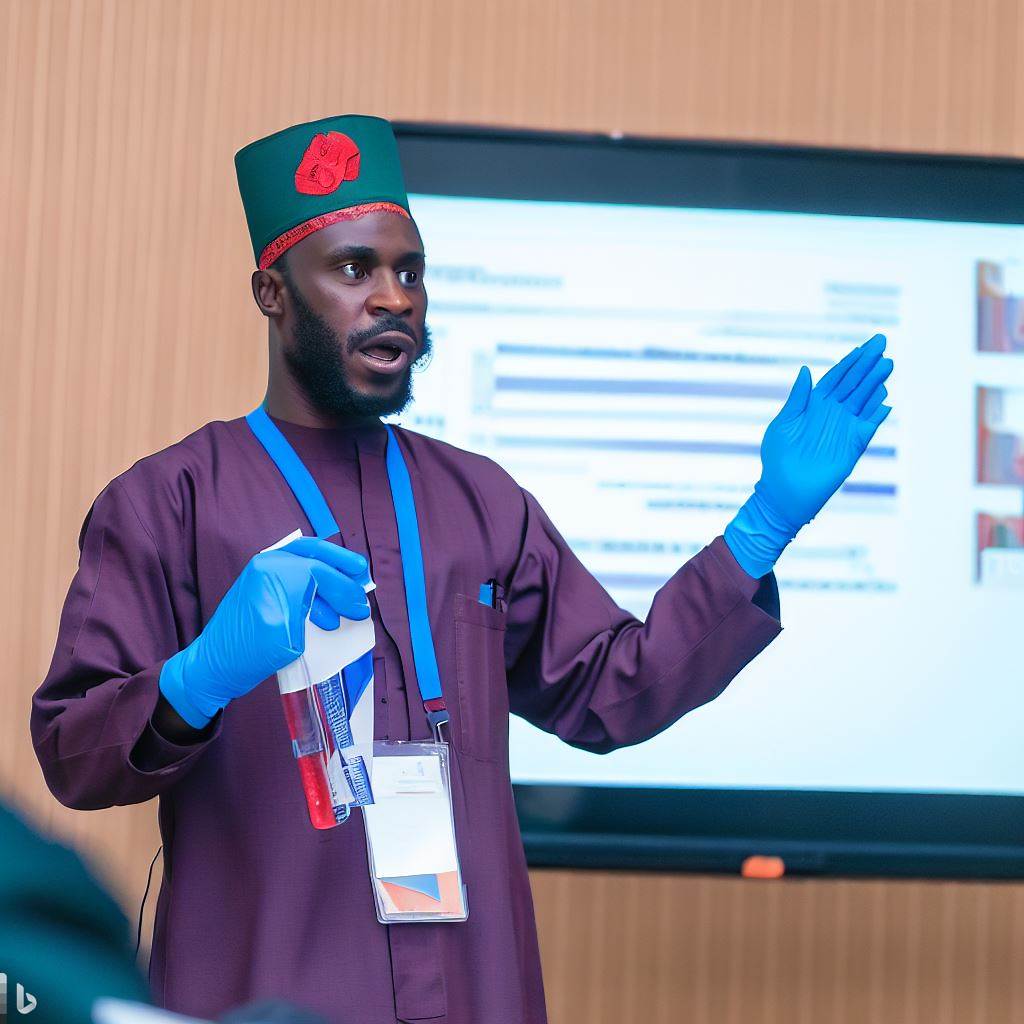Introduction
Balancing work and life is crucial for overall well-being and productivity. Being a phlebotomist in Nigeria adds specific challenges to achieving work-life balance.
Thesis statement
Balancing work and life as a phlebotomist in Nigeria presents unique challenges, but with effective strategies, it is possible to achieve a fulfilling and well-rounded lifestyle.
Finding the right balance between work and personal life is essential for maintaining happiness and overall well-being.
In today’s fast-paced world, where work demands seem to be increasing constantly, it is becoming increasingly important to prioritize self-care and create a harmonious balance between professional and personal responsibilities.
Being a phlebotomist in Nigeria further adds to the complexity of achieving work-life balance.
Phlebotomists are responsible for drawing blood samples from patients, performing various laboratory tests and procedures, and handling sensitive medical information.
These tasks require a high level of skill, precision, and attention to detail, leaving little room for personal time and relaxation.
In Nigeria, the healthcare system faces various challenges, such as a shortage of skilled healthcare professionals and limited resources.
As a result, phlebotomists often find themselves working long hours, dealing with high patient volumes, and facing immense pressure to deliver accurate results promptly.
Despite these challenges, it is possible for phlebotomists in Nigeria to achieve a fulfilling and well-rounded lifestyle by implementing effective strategies.
These strategies may include prioritizing self-care, setting boundaries between work and personal life, and seeking support from colleagues and loved ones.
Additionally, practicing time management techniques and engaging in activities that promote physical and mental well-being can contribute to maintaining a healthy work-life balance.
In the end, balancing work and life as a phlebotomist in Nigeria may be challenging, but it is feasible with the right strategies in place.
By prioritizing self-care, setting boundaries, and seeking support, phlebotomists can achieve a satisfying and well-rounded lifestyle.
It is crucial to remember that taking care of oneself is just as important as taking care of others.
Transform Your Career in Nigeria
Discover unmatched expertise with our personalized Career Consulting service. Navigate Nigeria’s job market with a strategy tailored just for you.
Get StartedOverview of the Phlebotomy Profession in Nigeria
What a phlebotomist does
A phlebotomist is a medical professional trained in drawing blood from patients. They are responsible for collecting blood samples, labeling them correctly, and ensuring proper storage.
Phlebotomists also handle blood transfusions, conduct tests, and maintain accurate records.
The demand and growth of the profession in Nigeria
The demand for phlebotomists in Nigeria has been steadily increasing due to advancements in medical technology.
With the rise in chronic diseases and the need for accurate diagnostic tests, the profession is in high demand.
As more healthcare facilities are being established, the demand for phlebotomists continues to grow. The profession offers a promising career path with opportunities for advancement and specialization.
The importance of work-life balance within this profession
Maintaining a healthy work-life balance is crucial for phlebotomists to prevent burnout and ensure quality patient care.
The profession can be physically and emotionally demanding, requiring long hours and irregular shifts.
Balancing work responsibilities with personal life allows phlebotomists to recharge and avoid stress-related issues.
By prioritizing self-care, phlebotomists can perform their duties effectively and provide compassionate care to patients.
Achieving work-life balance improves job satisfaction, mental well-being, and overall quality of life for phlebotomists.
Employers should support work-life balance by offering flexible schedules, manageable workloads, and adequate time off.
Phlebotomists should also proactively manage their time, set boundaries, and utilize self-care practices.
Work-life balance enables phlebotomists to excel in their profession while taking care of their personal and family needs.
In fact, the phlebotomy profession in Nigeria plays a critical role in the healthcare system. Phlebotomists are responsible for accurate blood collection, testing, and maintaining patient records.
The profession is in high demand due to the increasing prevalence of chronic diseases and the need for accurate diagnostics.
However, it is essential for phlebotomists to prioritize work-life balance to prevent burnout and ensure quality patient care.
Employers and phlebotomists themselves should take proactive measures to achieve a healthy balance between work and personal life.
Read: Covid-19 and Its Effect on Phlebotomy in Nigeria
Challenges Faced by Phlebotomists in Nigeria
A phlebotomist’s job in Nigeria comes with its fair share of challenges. From high workloads and limited resources to irregular work schedules and long working hours, these professionals face numerous obstacles in their day-to-day work.
Additionally, the inherent psychological and emotional stress of the job, along with the lack of support and recognition in the healthcare system, further exacerbate the challenges faced by phlebotomists in Nigeria.
High workload and limited resources
Phlebotomists in Nigeria often have to handle a high volume of blood specimen collections. With limited resources such as equipment and supplies, completing their tasks efficiently becomes challenging.
Shortages of vital materials like needles, tubes, and vacutainers affect the phlebotomists’ ability to work effectively. The lack of adequate infrastructure in healthcare facilities adds to the burden of their workload.
Irregular work schedules and long working hours
Phlebotomists in Nigeria often have irregular work schedules, including night shifts and weekend duties.
Long working hours and overtime work are common, affecting their work-life balance and personal commitments.
Publish Your Professional Profile, Business or Brand
Showcase your expertise, gain trust, and boost visibility instantly on Professions.ng.
Publish NowThese demanding schedules can lead to physical and mental exhaustion, impacting their overall well-being.
Psychological and emotional stress inherent to the job
The nature of a phlebotomist’s job involves encountering patients in distress, leading to emotional challenges.
Dealing with anxious or fearful patients and performing procedures in critical situations can be mentally draining.
Phlebotomists must cope with the emotional stress of handling blood-related emergencies and potential needlestick injuries.
Lack of support and recognition in the healthcare system
Phlebotomists in Nigeria often work in an environment where their role is not fully acknowledged or appreciated.
They may not receive adequate support from healthcare institutions and staff, hindering their professional growth.
The lack of recognition can also affect their motivation and job satisfaction. As a result, phlebotomists may feel undervalued and face challenges in advancing their careers.
Despite these challenges, phlebotomists in Nigeria play a crucial role in the healthcare system.
Their commitment and dedication to their profession ensure that patients receive the necessary laboratory tests and diagnostic information for effective medical treatments.
It is essential for healthcare organizations and policymakers to address these challenges and provide the necessary support and resources to phlebotomists, promoting their well-being and enabling them to deliver high-quality care.
Read: Career Progression in Optometry: A Nigerian Perspective
Effective Strategies for Balancing Work and Life as a Phlebotomist in Nigeria
Time management and prioritization techniques
- Create a daily schedule to plan and allocate time for work and personal activities.
- Prioritize tasks based on their urgency and importance to ensure efficient time allocation.
- Avoid procrastination by setting deadlines for each task and adhering to them.
- Use tools such as calendars, planners, or mobile apps to help organize and manage time effectively.
Read: Step-by-step Guide to Becoming a Nursing Assistant in Nigeria
Establishing clear boundaries between work and personal life
- Set specific working hours and strictly adhere to them to maintain a healthy work-life balance.
- Avoid bringing work-related stress or responsibilities into personal time and space.
- Communicate clearly with colleagues and supervisors about personal commitments and limitations.
- Allocate designated time for personal activities, hobbies, and relaxation to rejuvenate and recharge.
Developing coping mechanisms for stress management
- Practice stress-reducing techniques such as deep breathing exercises, meditation, or yoga.
- Engage in physical activities or hobbies that promote relaxation and provide an outlet for stress.
- Seek emotional support from friends, family, or support groups to share concerns and find solutions.
- Prioritize self-care by ensuring adequate rest, nutrition, and time for personal well-being.
Utilizing available resources and seeking support from colleagues
- Take advantage of training programs or workshops to enhance skills and knowledge related to phlebotomy.
- Seek guidance or mentorship from experienced colleagues to learn effective strategies for work-life balance.
- Foster a supportive work environment by collaborating with colleagues and sharing workload if possible.
- Stay connected with professional networks or associations to access resources and seek advice when needed.
By implementing these effective strategies, phlebotomists in Nigeria can achieve a better work-life balance, leading to increased job satisfaction and overall well-being.
It is crucial to prioritize self-care and maintain a healthy separation between work and personal life to ensure long-term success in this demanding profession.
Read: Advanced Career Paths for Pharmacy Technicians in Nigeria

Delve into the Subject: Exploring Psychiatry: The Role of Psychiatrists in Nigeria
Tips for Maintaining Physical and Mental Well-being
Incorporating regular exercise into the daily routine
- Include activities like walking, running, or cycling to stay physically active.
- Take breaks during work to stretch or do simple exercises like squats or lunges.
- Join a gym or fitness center to have access to a variety of exercise options.
Prioritizing healthy eating habits and maintaining a balanced diet
- Consume a variety of fruits, vegetables, whole grains, and lean proteins.
- Avoid processed foods, sugary snacks, and sodas that can negatively impact health.
- Drink plenty of water throughout the day to stay hydrated.
Practicing mindfulness and relaxation techniques
- Start the day with a few minutes of deep breathing or meditation to promote relaxation.
- Practice mindfulness by focusing on the present moment and avoiding excessive worrying.
- Take short breaks during work to close the eyes and relax the mind.
Engaging in hobbies and activities outside of work
- Pursue interests like painting, reading, gardening, or playing a musical instrument.
- Plan outings or trips with friends and family to create joyful experiences.
- Join social or community groups that share similar hobbies or interests.
By incorporating these tips into your routine, you can maintain a healthy work-life balance as a phlebotomist in Nigeria.
Remember, taking care of your physical and mental well-being is essential to thrive in both your personal and professional life.
Read: Success Stories: Prominent Nigerian Phlebotomists
Balancing Personal Relationships and Social Life
A phlebotomist’s work demands can sometimes make it challenging to maintain personal relationships and a fulfilling social life.
However, with effective strategies and conscious efforts, it is possible to create a healthy balance between work and personal life.
Communicating openly with family and friends about work demands
It is essential to have open and honest communication with your family and friends about the demands of your work as a phlebotomist in Nigeria.
Discuss your schedule, explain the nature of your job, and the potential challenges you may face.
It helps them understand your availability and accommodate your work demands when planning activities or events.
Scheduling quality time for loved ones and maintaining relationships
As a phlebotomist in Nigeria, prioritize spending quality time with your loved ones despite your demanding work schedule.
Plan special outings, dinners, or simply dedicate uninterrupted time to strengthen your relationships. It shows your commitment and helps create lasting bonds, even amidst work pressures.
Read: The Path to Becoming a Surgeon in Nigeria
Networking and participating in professional communities
Engaging in networking opportunities and being an active member of professional communities can enhance your social life as a phlebotomist in Nigeria.
Attend industry conferences, workshops, and seminars, where you can meet like-minded individuals who share similar interests and challenges.
These connections not only offer socializing opportunities but also provide a valuable support system to navigate the unique demands of your profession.
Exploring opportunities for personal growth and development
Investing time in personal growth and development can bring you a sense of fulfillment and contribute to a well-rounded life as a phlebotomist in Nigeria.
Enroll in relevant courses, workshops, or certifications that align with your interests and career goals.
This not only enriches your professional skills but also provides a platform to meet new people and expand your social circle.
Additionally, pursuing hobbies, engaging in regular exercise, and taking breaks to rejuvenate yourself are crucial for maintaining a healthy work-life balance.
In essence, as a phlebotomist in Nigeria, balancing work and personal life requires effective communication, scheduling quality time for loved ones, engaging in professional communities, and exploring personal growth opportunities.
By adopting these strategies and prioritizing self-care, you can create a harmonious and fulfilling life while pursuing your career as a phlebotomist.
Read: Challenges and Solutions in Nigeria’s Social Work Practice
Conclusion
Recap the main points discussed in the blog post
In this blog post, we have explored the challenges faced by phlebotomists in Nigeria in balancing their work and personal life.
We have highlighted the demanding nature of the job and the impact it can have on mental and physical well-being.
Publish Your Professional Profile, Business or Brand
Showcase your expertise, gain trust, and boost visibility instantly on Professions.ng.
Publish NowWe have also discussed strategies that can help phlebotomists achieve a better work-life balance.
The importance of work-life balance for phlebotomists in Nigeria
Work-life balance is crucial for phlebotomists in Nigeria as it helps maintain their overall well-being.
It enables them to handle the demanding nature of their job effectively, reduces stress levels, and enhances job satisfaction.
Encouraging readers to implement the suggested strategies and prioritize their well-being
To achieve a healthy work-life balance, we urge phlebotomists in Nigeria to implement the strategies shared in this blog post.
It is vital to prioritize self-care, set boundaries, and seek support when needed. By taking care of themselves, phlebotomists can excel in their profession and lead fulfilling personal lives.




